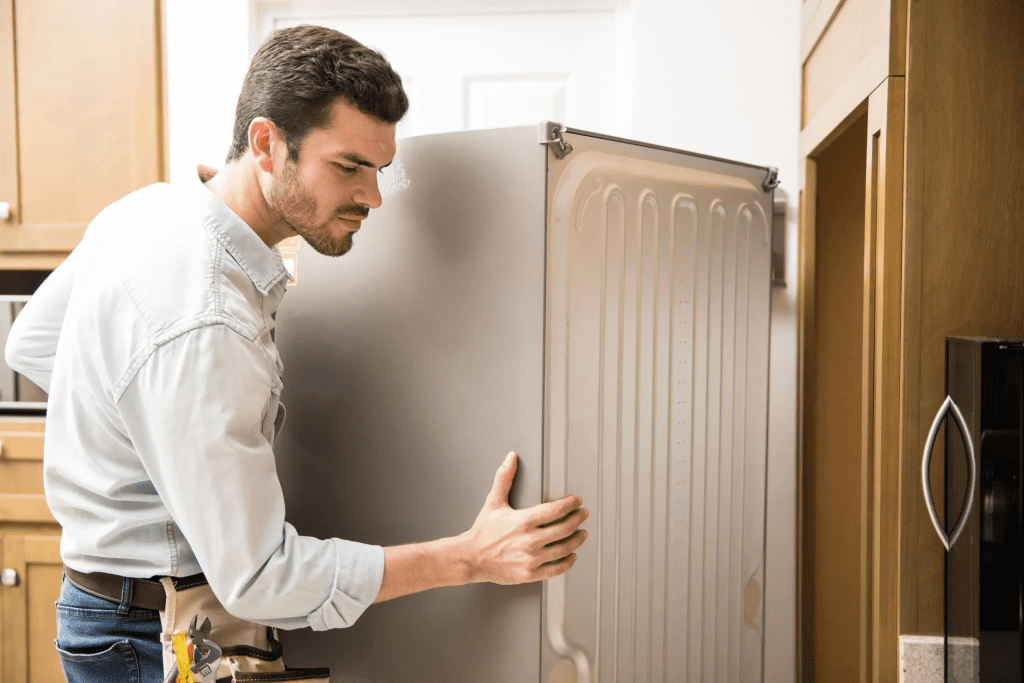A refrigerator is an essential appliance in any household, but did you know that improper use or placement can pose serious risks, including explosions? While refrigerators are generally safe, certain mistakes can make them hazardous. Here, we’ll uncover six common refrigerator mistakes and explain how to avoid them to keep your home safe.
1. Placing the Refrigerator Near Heat-Generating Appliances

One of the most dangerous mistakes people make is positioning the refrigerator too close to heat-generating devices like gas stoves, ovens, or microwaves. Heat exposure can compromise the refrigerator’s performance and, in extreme cases, lead to an explosion.
Why This is a Problem
- Heat can overwork the compressor, increasing the risk of malfunction.
- If nearby devices short-circuit, the heat and sparks can spread to the refrigerator, causing a fire.
Prevention Tips
- Always maintain at least a 12-inch gap between the refrigerator and any heat-emitting appliances.
- Avoid placing electrical wires near flammable items like curtains, blankets, or mattresses to minimize fire hazards.
2. Using an Old or Poorly Maintained Refrigerator
Refrigerators, like any other appliances, have a lifespan. Using an old refrigerator or neglecting regular maintenance can increase the risk of mechanical failure, leading to dangerous situations.
Signs of a Problem
- Continuous loud compressor noise.
- Excessive ice buildup in compartments.
- Poor cooling performance despite high energy consumption.
How to Stay Safe
- Hire a technician for regular inspections to check for issues like clogged capillary tubes or gas leaks.
- Replace old refrigerators, especially if they’ve undergone frequent repairs or show signs of wear and tear.
3. Storing Carbonated Drinks or Alcohol in the Freezer
Putting carbonated beverages or alcohol in the freezer may seem harmless, but it’s a common mistake that can cause unexpected explosions. These liquids are sensitive to extreme temperature changes.
What Happens Inside the Freezer
- Carbonated drink cans can’t withstand the rapid expansion caused by freezing, turning them into small “bombs.”
- Alcohol or beer can also experience pressure changes, which can result in violent bursts.
Safe Storage Practices
- Avoid freezing carbonated drinks or alcohol entirely.
- Use a refrigerator’s cooling compartment instead of the freezer to chill beverages safely.
- Never place glass bottles in the freezer, as expanding liquids can cause them to shatter or explode.
4. Gas Leaks and Electrical Leakage
A refrigerator’s gas system is designed to be sturdy, but leaks can still occur. When a gas leak combines with electrical sparks, the situation becomes extremely dangerous.
How This Can Happen
- A faulty weld or damaged gas pipe can cause gas leaks.
- Short circuits in the electrical wiring may ignite leaked gas, leading to explosions.
Preventive Measures
- Have a qualified technician inspect the refrigerator for gas leaks and electrical issues regularly.
- Ensure the household’s electrical system is equipped to handle high-capacity appliances, like refrigerators, to avoid overloads.
5. Overloading an Electrical Outlet
Plugging too many devices into the same outlet as the refrigerator is another mistake that can lead to short circuits and even fires. Refrigerators consume a significant amount of electricity and need a dedicated outlet.
Why This is Risky
- Overloading an outlet can cause overheating, resulting in a short circuit.
- The increased electrical load can damage the refrigerator and other devices plugged into the same outlet.

What You Should Do
- Use a dedicated outlet for the refrigerator.
- Avoid plugging multiple high-power devices into a single power strip or outlet.
6. Using Insect Repellents or Chemicals Near the Refrigerator
Using insect repellent, hairspray, or other chemical products near the refrigerator may seem harmless, but it can have explosive consequences. These products are often flammable and can react with electrical sparks.
How It Becomes Hazardous
- Sparks from the refrigerator’s electrical components can ignite chemical fumes, leading to explosions.
- The combination of flammable substances and heat from the refrigerator amplifies the risk.
Safety Recommendations
- Keep all chemicals and flammable products away from the refrigerator.
- Use insect repellents in other parts of the house, far from any electrical appliances.
Why Taking Precautions is Crucial
The risks associated with refrigerators aren’t just about energy inefficiency or minor inconveniences—they can have life-threatening consequences. Gas leaks, electrical short circuits, and improper usage are preventable issues that require attention. Ensuring proper placement, regular maintenance, and safe handling of chemicals near your refrigerator can make all the difference.
Conclusion: Simple Actions for a Safer Home

Avoiding these common mistakes can significantly reduce the risk of refrigerator-related accidents. By placing your refrigerator safely, maintaining it properly, and being mindful of what you store inside or near it, you can keep your home safe while ensuring your appliance functions efficiently. A little extra care today can save you from costly repairs—or worse—tomorrow.


